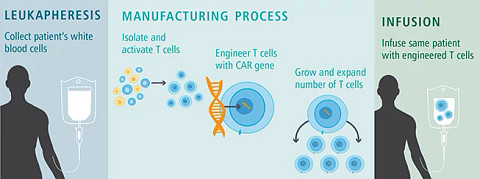
CAR T-cell therapy is a complex, multi-step process for patients:
- Evaluation: Patients undergo a series of tests and screenings to determine if CAR T-cell therapy is an appropriate treatment option.
- Collection: T cells are collected from patients via apheresis, a process that withdraws blood from the body, and moves through a cell separator to collect the needed blood components, in this case T cells. The remaining blood components are then returned into the body. The procedure is done in one day in a clinic at the Kraft Family Blood Donor Center at Dana-Farber Cancer Institute and Brigham and Women's Hospital.
- Engineering: The T cells are sent to a laboratory where they are genetically engineered to target a specific type of cancer.
- Multiplication: The genetically modified T cells are "expanded" by growing cells in the laboratory until there are millions of them. The process of engineering and growing sufficient quantities of CAR T cells can take a few weeks. When there are enough of them, the CAR T cells are frozen and sent to the hospital or center where the patient is being treated. At our center, these cells are returned and processed at Dana-Farber's Connell and O'Reilly Families Cell Manipulation Core Facility.
- Conditioning Therapy: Prior to infusion of the CAR T cells, patients may receive chemotherapy for their cancer. This helps to create space in your immune system for the infused CAR T cells to expand and proliferate.
- Infusion: When the CAR T cells are ready, the cells are infused through a central line, in a process similar to a blood transfusion. Patients may receive medications to prevent and control possible side effects of the newly-engineered cells. Patients may receive their CAR T cells in the hospital or in the outpatient clinic. The patient's physician will decide which approach is best.
- Recovery: Patients who receive CAR T-cell therapy have a risk/recovery period of approximately 2 to 3 months. During this period, patients will be evaluated for side effects and treatment response. It is not uncommon for patients to be admitted to the hospital during this period to manage complications from treatment. During the first 30 days after CAR T-cell infusion, patients need to remain close to our center for regular follow-up care. A resource specialist can assist in arranging for a place to stay during this time, if needed.
Throughout the entire process, careful measures are in place to ensure patients' safety.

